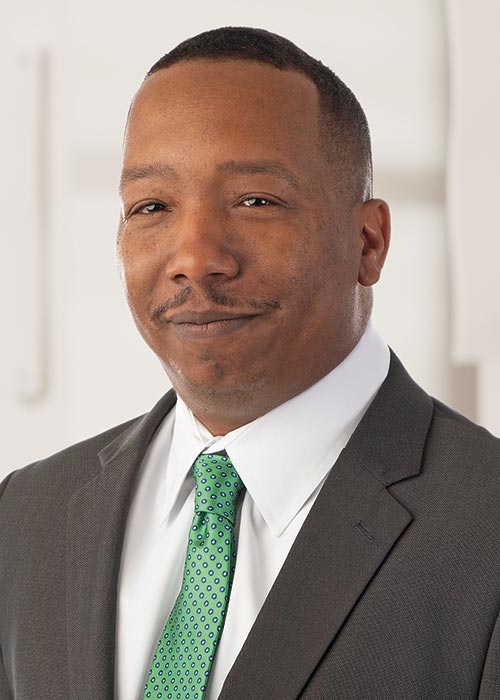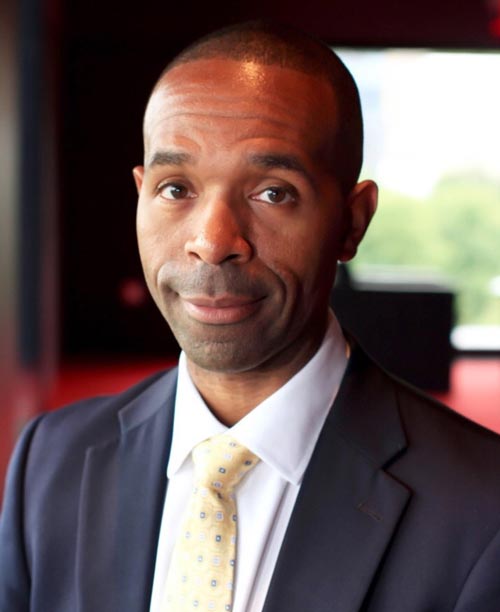Conference addresses issue of diversity in accounting
August 21, 2020
By Mike Killeen

Herschel Frierson

Orlando Bryant
Boz Bostrom faced a dilemma.
He was shocked by the murder of George Floyd in Minneapolis. But he asked himself, what could he do to help as a college professor?
“I’m a white man, and accounting is a very white profession,” said Bostrom, professor of accounting at the College of Saint Benedict and Saint John’s University. “We do not see students of color going into accounting a lot.
“I thought, ‘I’ve got to do something.’ “
Bostrom did.
Since 2015, he and Mary Jepperson, the Ralph Gross Chair in Business and the Liberal Arts and chair of the global business leadership department at CSB and SJU, had organized and led an in-person, eight-hour conference for accounting professors from Upper Midwest colleges.
This year’s conference was scheduled for April 17 in St. Paul, but was postponed by the COVID-19 pandemic.
But following the murder of Floyd on May 25, Bostrom reached out to members of the National Association of Black Accountants (NABA) and asked if the organization was interested in presenting at a virtual conference on improving diversity among accounting students and programs.
“They (NABA) were game for that, and so I sent a message to the (accounting) profs and just floated this idea – instead of eight hours in person, we’ll do four hours virtually,” said Bostrom, noting the conference would also address how COVID-19 has impacted accounting and how accounting faculty can best teach in an online or hybrid environment.
“I just floated it out, and the professors thought it was a great idea,” Bostrom said.
So did Herschel Frierson, chair of NABA’s Board of Directors and the managing director in the consulting group for Crowe LLP in Indianapolis, and Orlando Bryant, president of the Minneapolis/St. Paul Chapter of NABA and the senior security solutions consultant at ZeroFOX in Minneapolis.
“I was excited (about the conference),” said Frierson, noting it was the first time that NABA was able to address the issue of diversity with this large a group. “The more opportunities where we can speak about diversity and inclusion in accounting, I get excited about.”
Frierson said the representation of Blacks and African Americans in accounting is “nowhere where it needs to be. That’s why this conference was important.”
“This is really the first time I can recall where I’m talking to multiple professors from different universities,” he said. “I don’t know if there are other programs like it, but to me, it’s a game-changer.”
“During my initial discussion with Boz, I was happy that he engaged with NABA Twin Cities, as it was very timely,” Bryant said. “The topics that we came up with were both very important topics that need to be addressed, in addition to being extremely relevant with the current landscape - low numbers of Black students pursuing degrees in accounting, finance and other business- related career fields.”
On Aug. 5, just over 100 participants - representing 49 schools and several corporations across Minnesota, Iowa, Wisconsin, North Dakota and South Dakota - gathered virtually to discuss the two issues.
Frierson and Bryant; ZeNai Brooks, NABA Central Region president; Emerald Egwin, NABA Twin Cities event lead; and Kwadwo Owusu, student president at Minnesota State University, Mankato discussed increasing diversity among accounting students.
“The representatives from NABA did a fantastic job opening our eyes to the steps we can take as professors to make our teaching and student outreach more inclusive,” Jepperson said. “All students need to feel ‘seen,’ but this is particularly true for minority students.”
Among the ideas the panel suggested to the professors included:
- Getting to know all your students, including those that may not look like you. “Black students need to see people that look like them in the profession,” Jepperson said. “It can be a struggle in classes, feeling like ‘one of the few.’ I plan to be more deliberate in bringing in a diverse group of guest speakers so that everyone in class can visualize their own success in the world of accounting and finance.”
- Have firms and corporations increase internship and scholarship opportunities for students of color, and let students know of those opportunities.
- Partnering with high schools to encourage students of color to go into accounting at an earlier age.
- Make sure faculty are supportive of cultural events on their campuses.
- Finally, have white students get more comfortable with students and people of color. Bostrom said the CSB/SJU accounting program is looking into doing this through volunteer opportunities which would engage diverse community members, such tax preparation for low-income residents of St. Cloud, Minnesota.
“We were encouraged to engage with minority students and make sure they feel welcome to come to office hours – not just for help with the course,” Jepperson said. “Personal touches and helping students feel a personal connection with others in the class is key to a wonderful learning experience for everyone in the class.”
Both Frierson and Bryant thought their audience was receptive to increasing diversity in accounting and finance.
“I felt the group was very receptive and engaged during the presentation,” Bryant said. “The professors asked really good questions, on effective methods on how to approach and communicate with Black students. I should mention they were interested in learning how to work and interact well with Black and Brown students.
“I do feel that the professors are interested and working toward strategies to help increase diversity in accounting for the future. It was a testament based on the large number of professors that joined the virtual meeting and engaged with NABA leaders from the national, regional, local and student chapter levels,” Bryant added.
“You really know people are paying attention and are engaged when they are asking questions,” Frierson said. “All of the professors were very engaged, asked great questions and had great talking points in the chat room as well.
“I was excited to be a part of it, but even more excited to see the engagement from the professors, because we’re all, no matter how experienced we are, no matter how old we are, we always are in a state of education,” Frierson said. “We’re always trying to learn from one another. This was just another opportunity to do that.”
“I think we’re in a very unique place in college (to help minority students),” Bostrom said. “At the college level, I think we can put into place programs that repeat themselves each year. We can have a volunteer program that we funnel students into. We can invite students from Minneapolis high schools to campus each year. It’s just built in. We don’t have to wait for a big event like George Floyd’s murder in order to call for action.”
“I’m honored to have been a part of the conference,” Frierson said. “They’re doing great things in the area - the evidence of having over 90 professors be a part of it just kind of shows how important this is, and giving us the time to speak and have very frank conversations is always appreciated.”
Bostrom and Jepperson donated half of the conference’s registration fees (over $2,000) to NABA.
The second half of the conference dealt with how COVID-19 has impacted accounting. SJU graduates Greg Schlaefer ’95, audit partner at EY, and Darin McKee ’98, tax partner at Deloitte, spoke on their work during the pandemic (most CSB and SJU accounting graduates begin in these two areas) and the effect of new tax laws, like the CARES Act rebate.
That was followed by a discussion on the impact of the pandemic on campus recruiting, jobs and internships. That three-person panel included James McLean ’14, corporate recruiter at Best Buy.
The conference concluded with eight professors – including Jepperson – presenting on effective teaching strategies during the pandemic.
